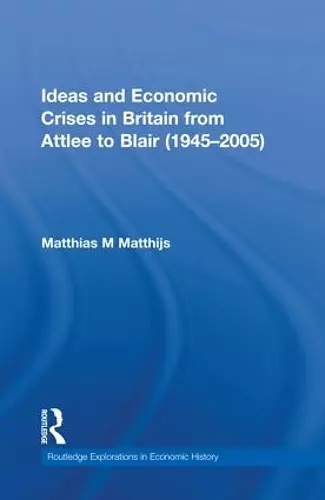Ideas and Economic Crises in Britain from Attlee to Blair (1945-2005)
Format:Hardback
Publisher:Taylor & Francis Ltd
Published:13th Aug '10
Currently unavailable, and unfortunately no date known when it will be back
This hardback is available in another edition too:
- Paperback£55.99(9780415533430)

During the period from 1945 to 2005, Britain underwent two deep-seated institutional transformations when political elites successfully challenged the prevailing wisdom on how to govern the economy. Attlee and Thatcher were able to effectively implement most of their political platforms. During this period there were also two opportunities to challenge existing institutional arrangements. Heath's 'U-turn' in 1972 signalled his failure to implement the radical agenda promised upon election in 1970, whilst Tony Blair’s New Labour similarly failed to instigate a major break with the 'Thatcherite' settlement.
Rather than simply retell the story of British economic policymaking since World War II, this book offers a theoretically informed version of events, which draws upon the literatures on institutional path dependence, economic constructivism and political economy to explain this puzzle. It will be of great interest to both researchers and postgraduates with an interest in British economic history and the fields of political economy and economic crisis more widely.
"The publication of this lively and meticulously researched book is especially timely, appearing as it does at a moment when the whole legacy of Thatcherism, to which Blair and New Labour were heirs, has been thrown in doubt by the Great Recession of 2007-09. A must-read for all who are keen to discern the future of British politics. " --Robert Skidelsky; a member of the House of Lords, Professor Emeritus of the University of Warwick, and the chief biographer of John Maynard Keynes.
"Every now and then, one book stands out for both content and timing. This is such a book. Its content is truly stellar, being simultaneously a definitive telling of the post-war UK story and a guide to its key moments of fundamental change. The timing of its publication could not be better, given that the UK faces just such a moment again now. The Matthijs thesis on how to turn crises into new economic settlements deserves the widest possible academic and popular readership. Anyone keen to leave both Thatcherism and New Labour behind needs to read Ideas and Economic Crises, and learn from it. I certainly have!" -- David Coates, Worrell Professor of Anglo-American Studies, Wake Forest University, USA
"In this absorbing study Matthias Matthijs reviews the complex interweaving of ideas and economic policies in Britain since 1945, and provides new insights into the Keynesian consensus, into Heath and Thatcher, and Blair and Brown. It is the perfect book for understanding the political and ideological context in which the Coalition Government is seeking to reduce the deficit and lay the foundations for economic recovery." -- Andrew Gamble, University of Cambridge
"In order to understand continuity and change in economic policy-making, argues Matthijs (international politics, American U. in Washington), it is necessary to analyze both the impact and the narration of economic crises in the shaping of policy because sometimes how the facts are explained is more important than the objective facts themselves for changing ideas about the role of the state in the economy and what the main goals of economic policy ought to be. This argument underlies his analysis of change and continuity in British economic policy-making, which focuses on four key moments of potential policy realignment -- the successful realignments under Clement Attlee (1945-1951) and Margaret Thatcher (1979-1990) and the failed realignments under Edward Heath (1970-1974) and Tony Blair (1997-2005) -- and the role of economic ideas within institutions." -- ©Feb 2011 Book News Inc.
ISBN: 9780415579445
Dimensions: unknown
Weight: 660g
272 pages